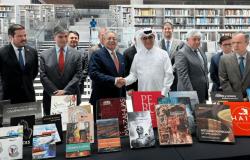In more than one poem ‘Ensers of Winter’, the book by Miguel Carcassona that Question recently published, presents the scene of someone looking out the window. And in a certain way, that image could be taken as a correlate of the entire collection of poems, with the poet on one side, reality on the other, and in the middle that glass that serves to sift the perception that one has of the other, and that in the background is nothing but the poem. It should not be forgotten that Miguel Carcassonne had already shown the importance of attentive looking when he titled a book of stories ‘An Eye Never Blinks’, a book that certainly did not lack the warm gaze of its author.
In this collection of poems, although it is winter, there is also an abundance of that warmth and closeness that Miguel Carcassonne manages to express with images and symbols that avoid the far-fetched and appeal to the next, with a tone that at no time needs to be elevated to reach moments of true intensity.. It is in this terrain where these winter belongings fit, with an air of inventory or storage, and a prominent place also for memories, which by the way, in addition to coming from sight, also come from hearing, with auditory evocation. and affective of the radio.
Social aspect in the second part
Perhaps it is in the poems of the second part, in which the social aspect prevails more, that this way of writing that is very close to emotions but never falls into the sentimentalism that characterizes the Carcassonne poems is most accentuated. But you can also find that refined poetic pulse in other more intimate or introspective compositions, where when you look out you can see the reflection of a human depth. And as if to redeem himself from those perhaps somewhat serious looks, the poet also occasionally slips in some equally subtle ironic turn, as when He refers to “the poets of the third millennium,” whom he reminds that “the navel eye is always a blind eye.”. Once again the look, which not even the poet himself can avoid, and which in the end he will remind him of “what you were and what you should have been.”
‘WINTER ITEMS’
Miguel Carcassonne
Ask
52 pages






